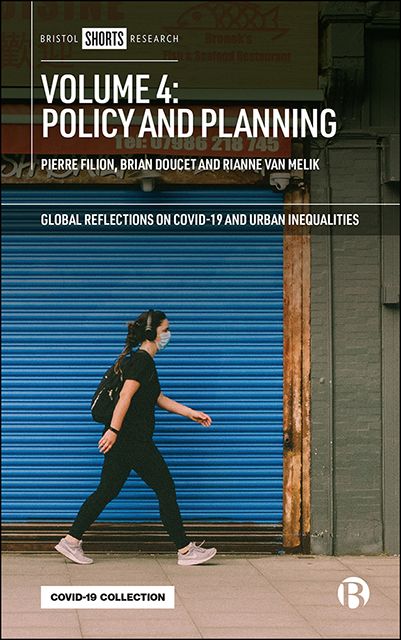Book contents
- Frontmatter
- Contents
- List of Figures and Tables
- Notes on Contributors
- Acknowledgments
- Preface to All Four Volumes of Global Reflections on COVID-19 and Urban Inequalities
- One Introduction: Policy Making in the Face of Uncertainty and Inequality
- Part I COVID-19 and Urban Changes
- Part II The Pandemic, Social Inequality, and Mobilization
- Part III Municipal and Urban Policy Responses
- Index
Fifteen - Urban Mobility, Working Culture, and Administration During the COVID-19 Crisis: Adjustments for a Resilient City
Published online by Cambridge University Press: 25 April 2023
- Frontmatter
- Contents
- List of Figures and Tables
- Notes on Contributors
- Acknowledgments
- Preface to All Four Volumes of Global Reflections on COVID-19 and Urban Inequalities
- One Introduction: Policy Making in the Face of Uncertainty and Inequality
- Part I COVID-19 and Urban Changes
- Part II The Pandemic, Social Inequality, and Mobilization
- Part III Municipal and Urban Policy Responses
- Index
Summary
Introduction
A resilient city can guarantee accessibility and mobility to its citizens and effectively mitigate adverse impacts of crises on its population and infrastructure (Holling, 1973; Holling and Gunderson, 2002). So far, the concept of ‘resilience’ has mostly been used in the context of disaster management and climate adaptation. However, during the COVID-19 crisis, the still rather vague concept of pandemic resilience has emerged. In the context of urban mobility, it refers to, for example, the facilitation of active mobility modes and the creation of livable public spaces. To date there is little research on the impact of governance, administrative structures, and planning processes on pandemic resilience.
Thirty-five interviews in four German areas – the metropolitan areas of Berlin, Leipzig, Bremen, and Stuttgart – were conducted with decision makers and stakeholders, including local politicians and civic servants, members of civil society organizations along with both private and public sector organizations providing transport services. While responsibility for the resilience of cities and infrastructures is shared in Germany between the federal, state, and local governments, this study focuses exclusively on the municipal level. The selection of respondents was guided by their position and role within organizations involved in the introduction of crisisrelated measures for cycling or walking. The interviews were conducted using a videoconferencing platform and lasted between 30 and 90 minutes. They were recorded, transcribed, and analyzed inductively and iteratively relying on multiple coders who developed a common coding system.
Our study attempts to answer the questions: what makes a city resilient in times of crises, using the pandemic as an example, and what lessons can be learned from self-reported issues that were encountered by actors and stakeholders in their response to the crisis? We analyze the issues that were reported by our interviewees and reflect on the problems that were experienced by municipalities. We also investigate the way in which adaptation measures were implemented during the COVID-19 crisis and whether they improve the long-term resilience of cities.
In the following, we share some of the insights gained from our study. In response to the social distance requirements, municipalities introduced different mobility measures such as pop-up bike lanes. We identify three types of crisis responses, and provide insights into the changes in administrative processes that were experienced by the interviewees. Furthermore, we reflect on the requirements for a resilient transport system that includes a robust public transport system.
- Type
- Chapter
- Information
- Volume 4: Policy and Planning , pp. 159 - 168Publisher: Bristol University PressPrint publication year: 2021



